On Advanced Design, Brain Function, and Quantum Computing
All about a solar sedan, a new GM design campus, Volvo’s impressive XC90, Porsche first-half sales, Nissan’s brain studies (!), Lucid Care for Lucid Air, and VW’s quantum computing
#electronics
Lightyear? Valmet Automotive?
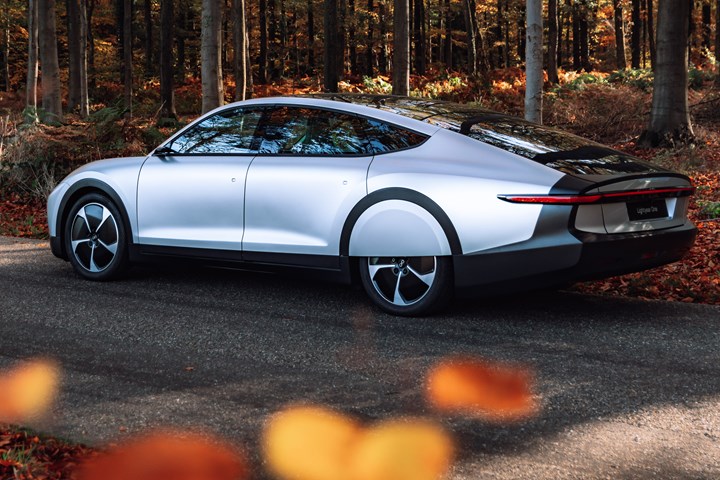
The Lightyear One. Solar-powered. And going into production in 2022—in Uusikaupunki, Finland. (Image: Lightyear)
It is a car company you’ve probably not heard of that has announced an agreement with a contract manufacturer that you may not have heard of but certainly know the vehicles it has built:
- Lightyear, founded in 2016 in the Netherlands, has developed the Lightyear One. A solar-powered sedan.
- Valmet Automotive, essentially established in 1968 as a joint-venture with Saab (it didn’t become officially known as “Valmet Automotive” until 1995), has been selected to build the Lightyear One, which it will put into production in its plant in Uusikaupunki, Finland, next year. Prototype build in January 2022. Production volumes by mid-2022.
About Valmet Automotive: In 1997 it started building the Porsche Boxster, and in 2005 the Porsche Cayman. In 2013 it started producing the Mercedes A-Class, and in 2017 the Mercedes GLC.
About Lightyear One: It is an electric vehicle, though its primary means of charging is via the five square meters of solar panels that form its roof. One hour of solar charging provides 12 km of range. It has a 60-kWh battery pack. It uses wheel motors.
In testing at the Aldenhoven Testing Center in Germany a few weeks back, a prototype drove on a single charge 710 km at a constant speed of 85 km/h.
///
The Word: Design
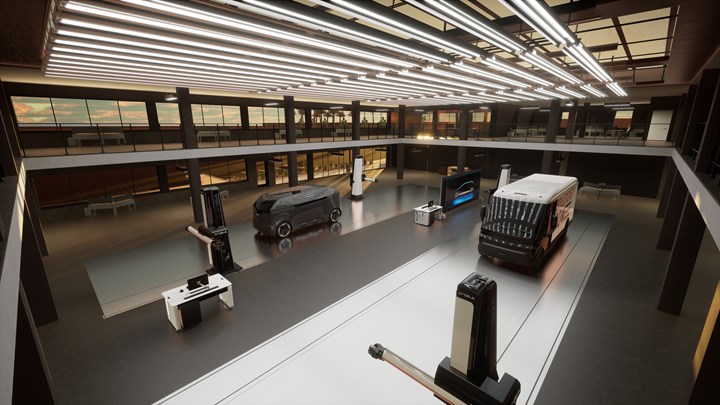
The proposed interior of the GM Advanced Design Center. Look closely: there is a Cruise Origin on the left plate and a BrightDrop EV600 on the right. (Image: GM)
Sure, we see that MotorTrend runs the 2022 Tesla Model S Plaid from 0 to 60 in under two seconds and are impressed.
But let’s face it: While there are outliers like that, odds are that most EVs are going to be pretty much like most other EVs, not Spaceball-caliber cars.
The motors will be fairly similar across the board, as will the battery range.
The performance differences will not be all that discernable.
So what will really become important?
Design.
General Motors certainly understands that.
And to underscore that point, it is investing >$471-million in constructing a design campus on eight acres in Pasadena, California.
The Advanced Design Center operations, when completed in the second half of 2022, will measure approximately 149,000-square feet. That’s more than double the size of the facility it currently has in North Hollywood, which it will vacate when the Pasadena campus is complete.
Bryan Nesbitt, GM executive director, Global Advanced Design and Global Architecture Studios:
“The collaborative nature of this facility will provide our advanced design team, cross-functional groups, prospective employees and external partners with the environment they need to continually redefine the boundaries of future mobility.”
And think about this: if there is a move to more “mobility as a service” rather than conventional vehicle ownership, how does a company assure that its products are preferential?
In a word: Design.
///
2021 Volvo XC90 Recharge T8 Inscription
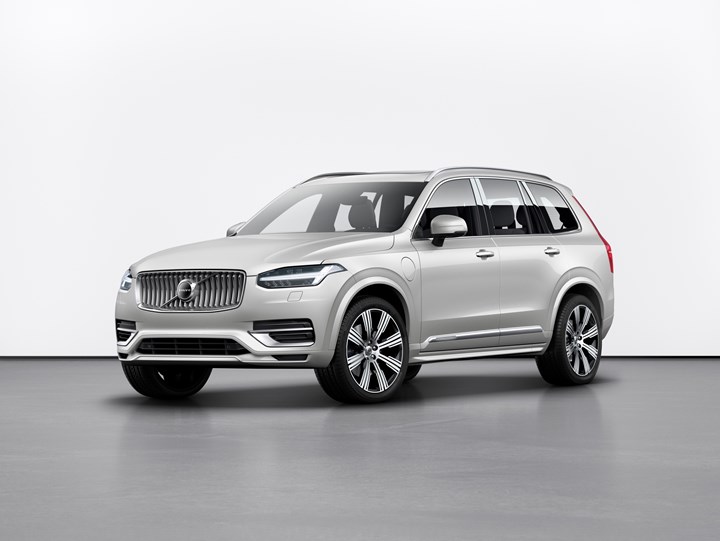
The word “confidence” manifest in sheet metal. (Image: Volvo)
There is an old British phrase that came to mind when spending time in the 2021 Volvo XC90 T8 E-AWD Inscription: “Safe as houses.”
Comfort meets structural security.
Certainly Volvo is legendary for the safety it engineers into its vehicles.
A Safety Vignette
Yes, every OEM runs instrumented crash tests.
Last fall, Volvo did something beyond that.
It took ten of its vehicles, different models, elevated each 30 meters with a crane, then dropped the vehicle.
CRASH!!!!
Håkan Gustafson, a senior investigator with the Volvo Cars Traffic Accident Research Team: “Normally we only crash cars in the laboratory, but this was the first time we dropped them from a crane. We knew we would see extreme deformations after the test, and we did this to give the rescue team a real challenge to work with.”
Part of the rationale is that rescue personnel typically learn how to perform extraction from vehicles taken from scrapyards, but Volvo knows that the steel construction of the safety cages that are part of their vehicles is a whole different thing from vehicles 10 years old.
Back to the XC90 Recharge T8 Inscription
It is a hybrid. A plug-in. It has a 2.0-liter four that is both supercharged and turbocharged. It is rated at 313 hp. Add in 87 electric motor hp and you get a system output of 400 hp and 472 lb-ft of torque.
This seven-passenger vehicle can tow 5,000 lb.
The vehicle feels substantial. Not land-locked like a house, but something that moves with what can be described as “authority.”
The seats seem more like furniture than, well, car seats. There is wood and metal and carpet like you’re going to find in a nice suite. The Bowers & Wilkins audio system is orchestrated to provide sound that sounds like what you’re going to hear in a living room.
This is an SUV. An AWD SUV. A mid-size luxury SUV.
There is a seemingly endless array of vehicles of this overall type out there. Some are less than the base price of $69,750. Some are more than the as-driven (options included range from backrest massage front seats to heated windshield wiper blades (remember: this car comes from Sweden)) MSRP of $81,690.
And while plenty are good, there is really something special about this Volvo. Not special in a flashy way. Just from the point of view that this is something that provides a sense of confidence in its solidity.
Which is absolutely the thing you want in a vehicle that is designed, engineered and manufactured to be comfortable, ergonomic and, above all, safe.
///
Paying Attention to Porsche
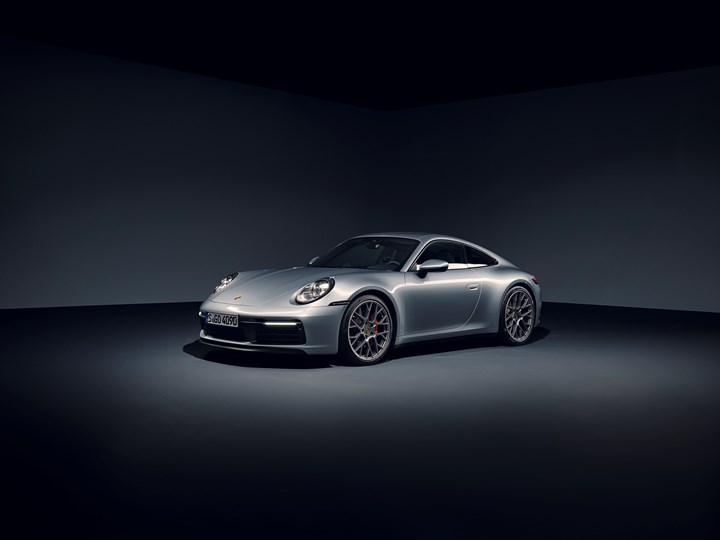
The Porsche 911. Of course it is popular. (Image: Porsche)
The people at Porsche probably busted out the Stuttgarter Hofbräu when the sales numbers for the first half of 2021 were tabulated: a new record, up 31% compared with 2020, to 153,656 vehicles globally.
That’s about what GMC sold in the second quarter of 2021 in the U.S. alone (153,025).
But there are some things worth paying attention to in the Porsche numbers:
- SUVs are hotter than sports cars: the Cayenne sales were up 12%, to 44,050 units. The Macan was the second-best selling vehicle, at 43,618 units, up 27%. So some 57% of all Porsche sales in the first half were SUVs.
- U.S. sales soared: By 50%. Total sales in the market were 36,326.
- German sales solid, but small: In the home country, a 22% increase but a total 13,094 vehicles.
- China is the biggest market (no real surprise): 48,654 vehicles sold there in the first half, a 23% increase.
But here is something of a surprise about sales in China:
“The demand for two-door sports cars in particular has recently grown significantly in China. A total of 2,324 units of the 911 were delivered between January and June, 83 percent more than in the previous year.”
While those 911 numbers are but a fraction of the total China sales, that Porsche management has discerned distinct demand for a vehicle type that has been all but otherwise written off is notable.
This is not to say that Cayenne sales will crater.
But keep that 911 rise in mind.
///
Get Smart
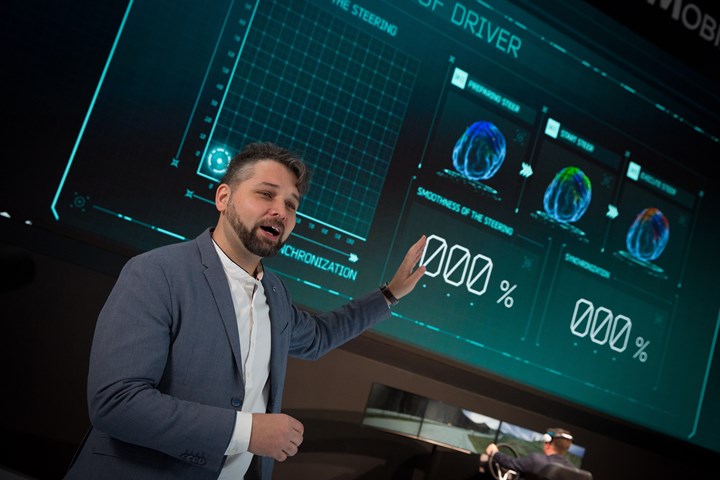
Dr. Lucian Gheorghe is examining the brains of race drivers. (Image: Nissan)
“Our brains are incredibly powerful. Without us realizing it, they perform a multitude of critical functions every second we drive our cars,” said Dr. Lucian Gheorghe, who is described as “a leader in the field of brain analysis and training.”
Described as such by Nissan Motor Co., Ltd. Nissan HQ, as it were.
Nissan has engaged Dr. Gheorghe to head up a new program, “Nissan Brain to Performance.”
It is to look at brain functions and anatomy. Specifically of racing drivers.
Nissan’s Formula E drivers, Sebastien Buemi and Oliver Rowland, will be part of the study.
In the first step their brain functions and those of a control group consisting of “average drivers” will be compared through their performance in driving simulators.
This sounds creepy. . .
“Once existing brain activity is known, a bespoke driver training program of electrical brain stimulation can be initiated, monitored, and reported.”
“Paging Col. Steve Austin. . .”
Dr. Gheorshe: “In the future, could our cutting-edge research help improve the driving skills of the average driver, and inform the development of our road-going EVs? We hope so.”
///
Lucid Knows the Real World Isn’t Always Smooth-Going
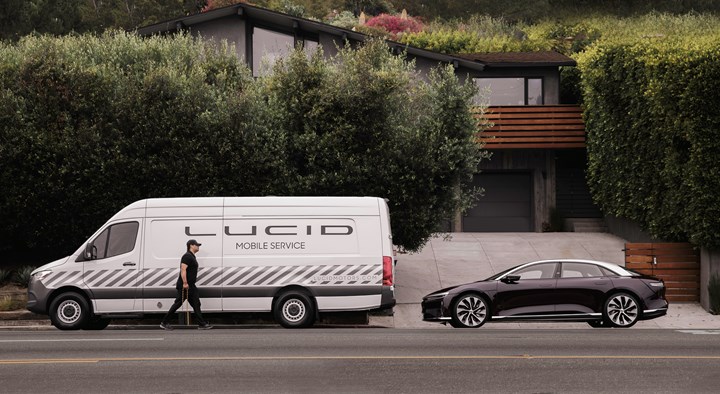
You don’t want this to happen. But you do want something like that truck to be there should that Lucid Air have a problem. (Image: Lucid)
That picture is surprising in that it comes from the Lucid, the OEM in question:
I mean, do you want to show your vehicle needing a service truck?
Still, credit to the company, which is supposed to have its Lucid Air model rolling out later this year, to admit that things do go wrong and so have developed “Lucid Care” (intentional rhyme with the name of the initial sedan?).
Not only does Lucid Care include the mobile service trucks (“equipped to handle the vast majority of service and maintenance needs”), but company-operated service centers, which will be located “in most major metro areas.”
The trucks, incidentally, are said to be so fully equipped that they can minimize the need to visit a service center.
There is four-year/50,000-mile complimentary roadside assistance that includes transporting a vehicle to the nearest Lucid Service Center, if necessary, as well as offering “alternate transportation.”
And let’s not forget. . .
Over-the-air (OTA) software updates.
According to Lucid the updates could provide diagnosis and repair of vehicles.
Certainly OTA updates can provide benefit.
But let’s remember that sometimes things happen IRL that necessitate the application of physics, not just digits.
///
Painting with Qubits
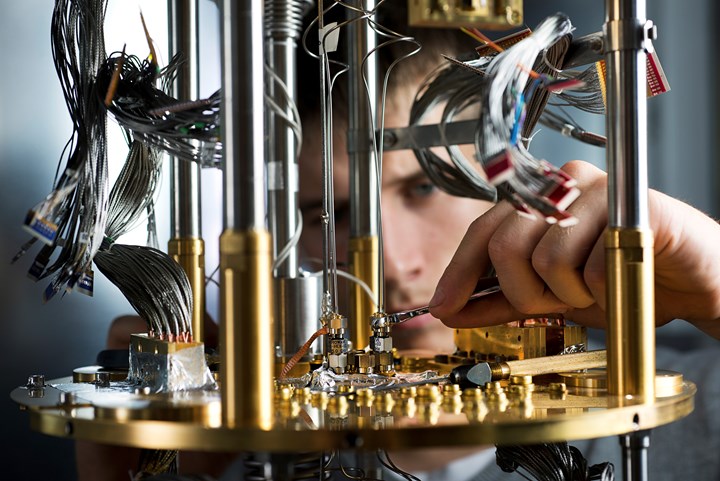
VW is working with quantum computing. Applications include such things as painting Tiguans and routing bus traffic. (Image: VW)
Computers, such as the one you’re reading this on (unless you work at a research institute of some sort where it takes a half-dozen retinal scans to get to the lobby), operate in a binary approach: One. Zero.
Quantum computers are different. There are “qubits.”
One.
Zero.
Both.
Go figure.
While it can be readily imagined that quantum computers would be handy for things that would cause a migraine just trying to image what’s going on, turns out there are more regular applications.
Volkswagen of America has had a team working on using quantum computers for everyday applications. The team is working with D-Wave, a Canadian quantum computing company, and Google (not surprising it is working on the computational approach).
A “regular” example:
In 2019 they established a live traffic-routing system in Lisbon, Portugal. It predicted traffic volumes and routed buses so that riders would have a minimal wait and traffic flow would be made as efficient as possible.
Beyond the Bus
Now they are looking at scheduling the paint shop in an assembly plant with quantum computing.
Typically, paint shops use two different primers. Which primer selected depends on the topcoat color.
So the approach is to batch vehicles to minimize the number of changeovers, which cause the production line to slow and the costs to rise.
They are finding that paint shop efficiency can be maximized by quantum computing determining the vehicle mix.
According to David Von Dollen, lead data scientist for Volkswagen Group of America, “Challenges like these may sound simple, but in some cases would require near-supercomputer levels of power to solve with traditional hardware.”
The paint scheduling is expected to be initially launched at VW factories in Germany, then proliferate from there.
One.
Zero.
Both.
RELATED CONTENT
-
On The Toyota Corolla Cross, Hyundai Santa Cruz, and VW Subscriptions
How to charge an autonomous vehicle. Toyota adds a new crossover. VW gets into the subscription business. Hyundai goes Santa Cruz. And more.
-
On The Jeep Grand Cherokee, 2022 Nissan Pathfinder, and More
An inside look at the Detroit Assembly Complex-Mack; a innovative approach to waste-free, two-tone painting; why a forging press is like an F1 car; and other automotive developments.
-
Solid Edge Brings Divergent Modeling Worlds Together
This new software suite allows the development of “beautiful models ready for production.” What more can you ask for?


.jpg;width=70;height=70;mode=crop)






